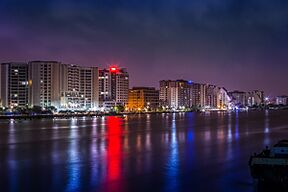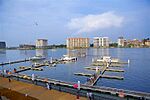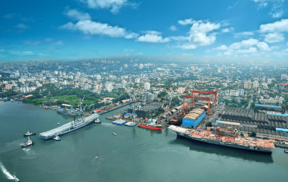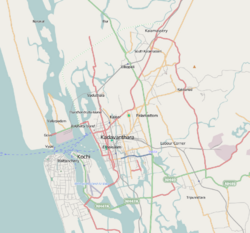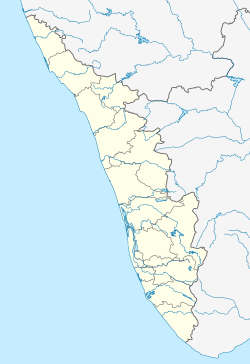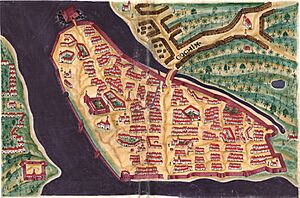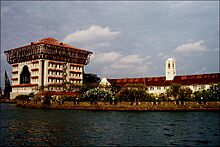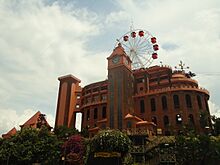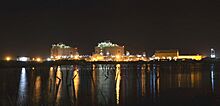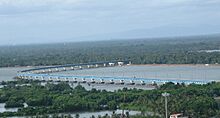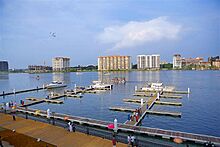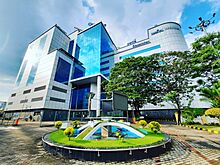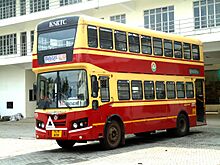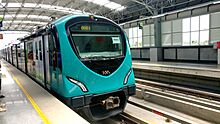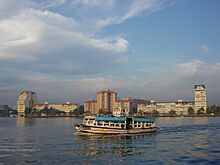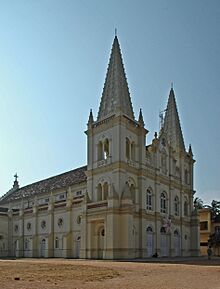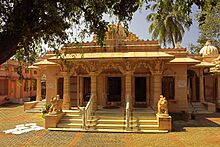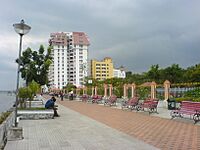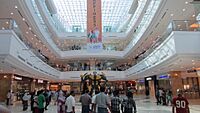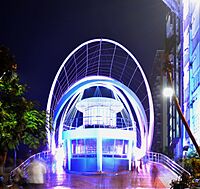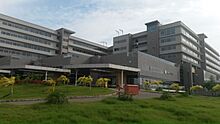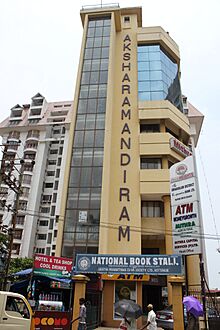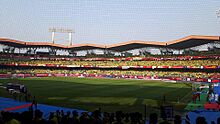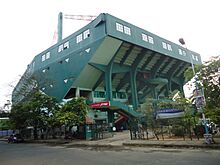Kochi facts for kids
Quick facts for kids
Kochi
Cochin
|
|
|---|---|
|
Marine Drive
Infopark Phase I
Chinese fishing nets
Hill Palace Museum
Kochi International Marina
Queen's Way
Skyline of Kochi from Cochin Shipyard
|
|
| Nickname(s):
Queen of the Arabian Sea
|
|
| Country | |
| State | |
| District | Ernakulam |
| Formed | 1 April 1958 |
| Government | |
| • Type | Municipal Corporation |
| • Body | Kochi Municipal Corporation, Greater Cochin Development Authority |
| Area | |
| • Metropolis | 94.88 km2 (36.63 sq mi) |
| • Metro | 440 km2 (170 sq mi) |
| Elevation | 26.02 m (85.37 ft) |
| Population
(2011)
|
|
| • Metropolis | 677,381 |
| • Density | 7,139.3/km2 (18,490.8/sq mi) |
| • Metro | 2,119,724 |
| Demonym(s) | English: Kochite, Cochinite, Malayalam: Kochikaran (M), Kochikari (F) |
| Languages | |
| • Official | Malayalam, English |
| • Minority | Tamil, Gujarati, Hindi, Kannada, Konkani |
| Time zone | UTC+5:30 (IST) |
| PIN (code)s |
682xxx, 683xxx
|
| Area code(s) | +91484xxxxxxx |
| Vehicle registration |
|
| Judicial Capital | High Court of Kerala |
| Coastline | 48 kilometres (30 mi) |
| Sex ratio | 1028 /♀ /1000♂ |
| Literacy | 98.5% |
| International airport | Cochin International Airport |
| Rapid Transit | Kochi Metro |
| Development Agency | GCDA, GIDA |
| Climate | Am (Köppen) |
| Precipitation | 3,228.3 millimetres (127.10 in) |
Kochi (/ˈkoʊtʃi/ KOH-chee), also known as Cochin, is a big port city on India's west coast. It's located in the state of Kerala, right next to the Laccadive Sea. Many people also call the city Ernakulam.
In 2011, the city of Kochi had a population of about 677,381 people. The larger area around Kochi, called the Kochi urban area, had over 2.1 million people. This makes it the biggest and most populated city area in Kerala. The city is managed by the Kochi Municipal Corporation.
Kochi is often called the Queen of the Arabian Sea. It has been a very important place for trading spices for a long, long time. In the past, the port of Muziris (near Kochi) traded with people from Rome, Persia, Arabia, and China.
From 1503 to 1663, the Portuguese ruled Kochi. Then, the Dutch took over in 1663. Later, the area was given to the United Kingdom. Kochi was part of the Kingdom of Cochin, which became a princely state under the British.
Today, Kochi is known as the main financial, business, and industrial center of Kerala. It's the only city in India with a water metro system, which uses electric boats. The Cochin International Airport is special because it's the first airport in the world to run completely on solar energy. Kochi is also a top tourist spot, famous for its Chinese fishing nets and the Kochi-Muziris Biennale art festival.
Contents
- What's in a Name?
- A Look at Kochi's Past
- Kochi's Location and Weather
- How Kochi is Governed
- Kochi's Economy
- Getting Around Kochi
- People of Kochi
- Kochi's Culture
- Health Services
- Learning in Kochi
- Helping Others
- Media and Entertainment
- Sports in Kochi
- Naval Presence
- Sister Cities
- Notable People
- See also
What's in a Name?
People from long ago, like travelers and traders, called Kochi by different names such as Cocym, Cochym, and Cochin. The Jewish community in Cochin called it Kogin. Arab traders called it Kashi.
The name Kochi might come from the Malayalam words kochu azhi, which mean 'small lagoon'. Italian explorers in the 15th and 17th centuries also called it Kochchi. They said it was named after a river that connects the backwaters to the sea.
After the Portuguese and British arrived, the name Cochin became official. But in 1996, the city went back to using a name closer to its original Malayalam name, Kochi.
A Look at Kochi's Past
Muziris, a port north of Kochi, was a major center for the spice trade for many centuries. It was known to Arabs, Greeks, Romans, Jews, Syrians, and Chinese. Kochi became important after the port of Muziris was damaged by a big flood in the Periyar River in 1341.
The first written records about Kochi come from a Chinese traveler named Ma Huan. He visited Kochi in the 15th century with Admiral Zheng He's fleet. Another Italian traveler, Niccolò Da Conti, also wrote about visiting Kochi in 1440.
The rulers of Perumpadappu moved to Kochi and started the Kingdom of Cochin. When Vasco Da Gama arrived in Kozhikode, the ruler of Cochin teamed up with the Portuguese against the Zamorin of Calicut.

In the early 15th century, Calicut and Kochi were rivals. China's Ming dynasty decided to help Kochi by giving its ruler, Keyili, a special status. This stopped Calicut from invading Kochi for a while. But after the Chinese stopped their voyages, the Zamorin of Calicut did invade Kochi.
Historians believe the Kingdom of Kochi started in the early 12th century. The ruling family was called the Perumpadappu Swaroopam.
The port at Kozhikode was the most important in medieval Kerala. But Kochi, along with Kannur and Kollam, were also important trading ports. The Portuguese arrived in India in 1498. Pedro Álvares Cabral started the first European settlement in India in Kochi in 1500.
From 1503 to 1663, Fort Kochi was ruled by Portugal. This time was difficult for the Saint Thomas Christians, Muslims, and Jews because of the Inquisition. Vasco da Gama, the first European explorer to sail to India, was buried in St. Francis Church in Kochi before his remains were moved back to Portugal.
The Dutch took over after the Portuguese. They renamed Fort Immanuel to Fort Stormsburg. In 1664, the Fort Kochi Municipality was set up, making it the first municipality in India. Later, the Mysore ruler Hyder Ali took control of Kochi in 1773.
In 1814, the Dutch gave Kochi to the United Kingdom. The Fort Kochi municipality was started again in 1866. In 1896, the Maharaja of Cochin, Rama Varma XV, started local councils in Mattancherry and Ernakulam. By the 1870s, the capital of the Kochi Kingdom moved to Tripunithura, and then to Ernakulam in 1910.
In 1925, the Kochi legislative assembly was formed. Trade at the port grew a lot, so Robert Bristow was brought in to develop the harbor in 1920. In 21 years, he made Kochi one of the safest harbors for ships.
When India became independent in 1947, Cochin was the first princely state to join India. In 1949, Cochin merged with Travancore to form the Travancore–Cochin state. In 1956, this state became part of the new state of Kerala. On November 1, 1967, the Kochi Municipal Corporation was formed by combining the municipalities of Ernakulam, Mattancherry, and Fort Kochi, along with some other areas.
Kochi's economy grew quickly after India's economic reforms in the early 1990s. Since 2000, the service industry has boosted the city's economy. New IT parks and port facilities led to a boom in construction and real estate. Kochi has become the main business hub of Kerala.
Kochi's Location and Weather
Geography
Kochi is on India's southwest coast. The city is built around backwaters, including a peninsula, several islands, and part of the mainland. To the west is the Laccadive Sea. Most of Kochi is at sea level, with a coastline of 48 km.
The eastern part of Kochi is called Ernakulam, and the western part is called Western Kochi. The city's wider area includes Ernakulam, Fort Kochi, and suburbs like Edapally, Kalamassery, Aluva, and Kakkanad. It also includes islands in the Vembanad Lake.
The soil in Kochi is made of sediments like alluvium and brown sands. Salty soils are found near the backwaters. The main rocks are ancient dykes, charnockites, and gneisses. The Mangalavanam Bird Sanctuary, a special natural area, is in the city center. It has many mangrove trees and is a home for migratory birds.
Kochi gets its water from underground sources and two rivers: Periyar and Muvattupuzha.
Climate
Kochi has a tropical monsoon climate. Because it's close to the equator and on the coast, temperatures don't change much throughout the year. It's usually warm and humid. Temperatures are typically between 23°C and 31°C. The highest recorded temperature was 36.5°C, and the lowest was 16.3°C.
From June to September, the south-west monsoon brings heavy rains because Kochi is on the side of the Western Ghats facing the wind. From October to December, the northeast monsoon brings lighter, but still significant, rain. Kochi gets about 3014.9 mm of rain each year, with an average of 124 rainy days.
| Climate data for Kochi (Kochi Naval Base) 1981–2010, extremes 1951–2012 | |||||||||||||
|---|---|---|---|---|---|---|---|---|---|---|---|---|---|
| Month | Jan | Feb | Mar | Apr | May | Jun | Jul | Aug | Sep | Oct | Nov | Dec | Year |
| Record high °C (°F) | 36.4 (97.5) |
35.7 (96.3) |
36.0 (96.8) |
36.5 (97.7) |
35.2 (95.4) |
34.2 (93.6) |
33.1 (91.6) |
32.5 (90.5) |
34.2 (93.6) |
34.6 (94.3) |
35.0 (95.0) |
35.2 (95.4) |
36.5 (97.7) |
| Mean daily maximum °C (°F) | 31.9 (89.4) |
32.0 (89.6) |
32.6 (90.7) |
33.0 (91.4) |
32.4 (90.3) |
30.3 (86.5) |
29.6 (85.3) |
29.5 (85.1) |
30.2 (86.4) |
30.7 (87.3) |
31.3 (88.3) |
31.9 (89.4) |
31.3 (88.3) |
| Mean daily minimum °C (°F) | 23.0 (73.4) |
24.2 (75.6) |
25.5 (77.9) |
25.9 (78.6) |
25.7 (78.3) |
24.2 (75.6) |
23.8 (74.8) |
24.0 (75.2) |
24.2 (75.6) |
24.1 (75.4) |
24.1 (75.4) |
23.2 (73.8) |
24.3 (75.7) |
| Record low °C (°F) | 16.5 (61.7) |
16.3 (61.3) |
21.6 (70.9) |
21.2 (70.2) |
21.1 (70.0) |
20.4 (68.7) |
17.6 (63.7) |
20.6 (69.1) |
21.1 (70.0) |
19.2 (66.6) |
19.2 (66.6) |
17.7 (63.9) |
16.3 (61.3) |
| Average rainfall mm (inches) | 24.3 (0.96) |
27.1 (1.07) |
45.0 (1.77) |
113.1 (4.45) |
284.5 (11.20) |
700.3 (27.57) |
575.5 (22.66) |
378.8 (14.91) |
310.3 (12.22) |
366.6 (14.43) |
150.4 (5.92) |
39.0 (1.54) |
3,014.9 (118.70) |
| Average rainy days | 1.1 | 1.2 | 2.6 | 6.9 | 11.0 | 23.0 | 22.8 | 19.0 | 13.4 | 14.2 | 7.2 | 1.8 | 124.2 |
| Average relative humidity (%) (at 17:30 IST) | 61 | 65 | 68 | 70 | 73 | 82 | 83 | 82 | 79 | 77 | 72 | 64 | 73 |
| Average ultraviolet index | 11 | 12 | 12 | 12 | 12 | 12 | 12 | 12 | 12 | 12 | 10 | 10 | 12 |
| Source 1: India Meteorological Department | |||||||||||||
| Source 2: Weather Atlas | |||||||||||||
How Kochi is Governed
| Kochi Municipal Corporation officials | |
|---|---|
| Mayor | Anilkumar M |
| Deputy Mayor | Ansiya K A |
| Police Commissioner | M.P.Dinesh IPS |
The city of Kochi is run by the Kochi Corporation. It is led by a mayor. The city is divided into 74 areas called wards. People in these wards elect members to the corporation council every five years.
Before, Fort Kochi, Mattancherry, and Ernakulam were separate towns. They later joined to form the Kochi Corporation. The main office is in Ernakulam, with smaller offices in other parts of the city. The corporation handles things like city planning, health, and waste disposal.
The GCDA and GIDA are government groups that help develop the Kochi area. They work on improving the city's facilities.
Law and Order
Kochi is home to the High Court of Kerala, which is the highest court in the state. The Kochi City Police keeps law and order. It is led by a Police Commissioner. The city has 19 police stations.
Kochi's Economy
Kochi is often called the financial and business capital of Kerala. It has good electricity, fresh water, a long coastline, and a major port. These things have helped industries grow in the city. In recent years, many businesses have invested in Kochi, making it one of India's fastest-growing cities.
The main business areas include construction, manufacturing, shipbuilding, shipping, seafood and spice exports, chemicals, information technology (IT), tourism, health services, and banking. Kochi is one of the 17 major industrial cities in India, according to the World Bank.
Like other parts of Kerala, tourism is a big part of Kochi's economy. Ernakulam district, where Kochi is located, gets the most tourists in Kerala. Fort Kochi has many historical places, museums, and natural spots like the Vembanad lake and backwaters that attract visitors. The Kochi Port is a popular stop for international cruise ships. The city also has the first marina in India, the Kochi Marina, which attracts many yachts.
The Cochin Shipyard is the largest shipbuilding and maintenance place in India. The fishing harbor at Thoppumpady provides fish for local and export markets. The Vallarpadam Terminal is India's largest terminal for moving containers. Kochi is also a major exporter of spices and has the International Pepper Exchange, where black pepper is traded globally.
The IT industry is growing in Kochi. Places like InfoPark, Cochin Special Economic Zone, and KINFRA Export Promotion Industrial Park are located outside the city. SmartCity at Kakkanad is another important project.
Kochi also has an electronics industry with companies like V-Guard Industries. The government is building an "Electronic City" for these industries. The Cochin International Airport is also planning an aerotropolis, which is a city built around an airport.
Getting Around Kochi
By Air
The main airport for Kochi is the Cochin International Airport (CIAL). It's about 28 km north of the city. This airport handles both flights within India and international flights. It was the first international airport in India built without government money. It's also the first airport in the world to run completely on solar energy.
The airport has direct flights to places in the Middle East, Malaysia, Thailand, Singapore, and many major Indian cities. It's the biggest and busiest airport in Kerala.
By Road
Kochi is connected to nearby cities and states by several highways. However, the roads sometimes struggle to handle all the traffic, leading to congestion.
Major highways serving Kochi include National Highway 66 and National Highway 544. Several state highways also connect Kochi to other parts of Kerala. Important city roads include Mahatma Gandhi Road and Seaport-Airport Road.
Public Transport
Road Transport
Most public transport in Kochi uses private bus networks. The state-run bus service also operates here. The main bus stations are Ernakulam Town, Ernakulam Jetty, and Kaloor. The Mobility Hub is being built to connect buses, metro, and ferries.
Kochi has modern air-conditioned and non-air-conditioned buses. Taxis and auto rickshaws (called autos) are also available.
Rail Transport
Kochi has four main railway stations: Ernakulam Junction (South), Ernakulam Town (North), Aluva, and Tripunithura. The South station is one of the busiest in South India. The Cochin Harbour Terminus connects the port area.
Metro System
The Kochi Metro is a fast train system that helps reduce traffic in the city. The first part of the metro opened in June 2017. It connects Aluva to Maharaja's College, covering 18.4 km with 16 stations.
Water Transport
Kochi is one of India's major seaports. The port is managed by the Cochin Port Trust. It has facilities for cargo and passenger ships. The port includes three islands, one of which is man-made.
Boat services connect different parts of the city and nearby islands. The junkar ferry carries vehicles and people between islands. In April 2023, Kochi launched India's first Kochi Water Metro project. This system connects 10 islands with a network of 15 routes and 38 jetties.
People of Kochi
| Religions in Kochi City (2011) | ||||
|---|---|---|---|---|
| Religion | Percentage | |||
| Hinduism | 43.78% | |||
| Christianity | 38.12% | |||
| Islam | 17.56% | |||
| Others | 0.54% | |||
Kochi has the highest population density in Kerala, with 7139 people per square kilometer. In 2011, the wider Kochi area had about 2.1 million people. There are more females than males, with 1,028 females for every 1,000 males. Kochi has a high literacy rate of 97.5%.
The main religions in Kochi are Hinduism, Christianity, and Islam. Smaller groups of Jains, Jews, Sikhs, and Buddhists also live here. Even though Hinduism is the largest religion, Christianity has a big following (38%), making Kochi a city with one of the largest Christian populations in India.
Most people in Kochi are Malayalis. But there are also many people from other parts of India, like Tamils, Gujaratis, Jews, Anglo-Indians, Sikhs, and Konkanis. Malayalam is the main language, but English is also widely used, especially in business. Tamil and Hindi are understood by many.
Kochi is known for being a very livable city. In a 2011 report, it ranked first in Kerala and sixth in India for liveability. It was also ranked the fourth cleanest city in India. Kochi was chosen as one of India's "smart cities" by the Prime Minister.
Kochi's Culture
Kochi has a diverse and multicultural community. People from all over Kerala and India live here. This mix includes Malayalis, Konkanis, Gujaratis, Bengalis, Marathis, Punjabis, Tamilians, Kannadigas, Biharis, Anglo Indians, and a few Jewish families. The city once had a large Jewish community, who were important in business.
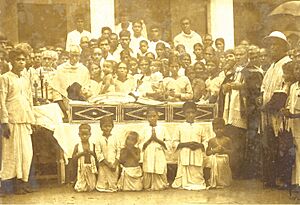
Kochi celebrates traditional Kerala festivals like Onam and Vishu. It also celebrates North Indian Hindu festivals like Holi. Christian festivals like Christmas and Easter, and Islamic festivals like Eid ul-Fitr, are also celebrated. A fun festival called the Cochin Carnival takes place in Fort Kochi in December.
People from Kochi are called Kochiites. They are part of the South Indian culture. However, the city's culture is changing, and Kochiites are becoming more modern. They often wear Western clothes instead of traditional Kerala wear.
Kochiites enjoy Keralite food, which uses a lot of coconut and spices. Other South Indian, Chinese, and North Indian foods are also popular. Fast food is very common. Because Kochi is near the ocean, seafood is a big part of the food. Kochi is known as the food capital of Kerala, with many restaurants.
Kochi has many shopping malls, including LuLu Mall, which is one of the largest in India. The city also has many five star hotels from international brands.
Kochi was home to famous Malayalam writers and social reformers. The Kochi International Book Festival is an annual event. The Maharajas of Kochi loved arts, and you can see their paintings at the Hill Palace and the Dutch Palace.
Kochiites love sports, especially football and cricket. The Jawaharlal Nehru International Stadium is one of India's largest stadiums. The Regional Sports Centre is a major sports hub.
Health Services
Kochi has some of the best healthcare facilities in India. Many people from Kerala, India, and other countries come here for advanced medical care because it's good and often less expensive. Kochi is the only city in Kerala that has successfully performed heart transplants.
Some of the big hospitals include Amrita Institute of Medical Sciences and Research Centre, Sunrise Hospital, and Aster Medcity. There are also government hospitals like General Hospital, Ernakulam and Government Medical College, Ernakulam.
In 2019, a home daycare program called Arike started. Nurses trained in palliative care visit patients at home on two-wheelers.
Learning in Kochi
Schools
Schools in Kerala follow a similar pattern. There are government schools and government-aided schools, which are part of the Kerala State Education Board. Many private schools are linked to the CBSE or ICSE. Some schools also follow international learning plans.
There are many schools in Kochi, including government schools, private aided schools, and private unaided schools. Some well-known schools include Sree Rama Varma High School, Kendriya Vidyalaya, and Navy Children School.
Colleges and Universities
The Cochin University of Science and Technology (CUSAT) is a major university in Kochi. Most colleges in Kochi are connected to either Mahatma Gandhi University or Cochin University. Kochi also has a campus of the Indian Maritime University.
Kochi has some leading business schools. Cochin University's School of Management Studies was the first management education institution in South India.
The city also has four medical schools. Some famous general colleges are Maharaja's College and St. Albert's College. For engineering, there's School of Engineering CUSAT and Model Engineering College.
Since the High Court of Kerala is in Kochi, there are also several top law schools, like the Government Law College-Ernakulam and the National University of Advanced Legal Studies (NUALS).
Helping Others
Kochi has many places that help people in need. Some main orphanages and shelters include Palluruthy Relief Settlement, Don Bosco Sneha Bhavan, and Crescent Girls Orphanage.
The Palluruthy Relief Settlement helps about 300 people, many of whom have mental health issues. The Kochi Municipal Corporation also runs a safe night shelter for women.
The Don Bosco Sneha Bhavan helps children who are homeless or in risky situations. They have homes for boys and girls, providing shelter, food, clothes, and school support. The Childline India project in Cochin works with Don Bosco to help children in distress.
Some people also do independent social work. Sister Fabiola runs "Ashwasa Bhavan" for orphaned children in Fort Kochi. Brother Judson has a "Mobile Bath Service" for abandoned people.
Media and Entertainment
Many Malayalam newspapers are published in Kochi, such as Malayala Manorama and Mathrubhumi. Popular English newspapers include The Hindu and The New Indian Express. There are also newspapers in other languages like Hindi and Tamil.
Kochi is home to several Malayalam television channels, including Asianet Plus and Mazhavil Manorama. Prasar Bharati has its broadcasting center in Kakkanad. You can also get satellite TV services.
FM radio channels like Rainbow FM and Club FM broadcast from Kochi.
Kochi is a big center for the Malayalam movie industry. Many movies are filmed here, and there are modern facilities for making and editing films. Many film stars and experts live in Kochi.
The city has over 50 cinema halls that show movies in Malayalam, Tamil, English, and Hindi. Kochi has Kerala's first cine multiplex at the Oberon Mall.
Kochi has the most telephone connections in Kerala. Many private companies provide phone services, and most have their main offices for Kerala in Kochi.
Sports in Kochi
Like in other parts of Kerala, football is a very popular sport in Kochi. The Kerala Blasters football club represents the city and state in the Indian Super League (ISL). They are one of the most supported clubs in India. Kochi also hosted games for the 2017 FIFA U-17 World Cup.
The Jawaharlal Nehru International Stadium in Kaloor is a major place for football and cricket. It's one of India's largest stadiums. Kochi was also home to the Kochi Tuskers Kerala cricket team in the Indian Premier League.
The Rajiv Gandhi Sports Complex is a large indoor stadium used for badminton, tennis, and basketball. It also has a swimming pool.
Kochi has two golf courses. The oldest is at Bolgatty Palace, built in 1903. The Cochin Golf and Country Club near the airport is Kerala's first 18-hole golf course.
Because Kochi is surrounded by water, it's great for Yachting. The Kerala Yachting Association and the Cochin Yacht Club hold regular tournaments. Kochi was the only Indian city chosen as a stop for the 2008–09 Volvo Ocean Race.
| Club | Sport | League | Stadium | Established |
|---|---|---|---|---|
| Kerala Blasters FC | Football | Indian Super League | Jawaharlal Nehru Stadium (Kochi) | 2014 |
| Kochi Blue Spikers | Volleyball | Pro Volleyball League | Rajiv Gandhi Indoor Stadium | 2018 |
| Godspeed Kochi | Racing | Indian Racing League | 2022 | |
| Kochi KD's | Arm Wrestling | Pro Panja League | 2023 | |
| Golden Threads FC | Football | Kerala Premier League | 2010 |
The Southern Naval Command, one of the three main parts of the Indian Navy, has its headquarters in Kochi at INS Venduruthy. It is led by the Flag Officer Commanding-in-Chief. This command includes training centers, bases, and ships. It also has a naval air station and a ship repair yard.
Indian Navy Day is celebrated here with a week-long public event. You can see warships, planes, helicopters, and other naval equipment.
The Cochin Shipyard Limited is the largest place in India for building and maintaining ships. In 2020, it finished building the first aircraft carrier made in India for the Indian Navy.
Sister Cities
Kochi is connected with these cities around the world:
 Norfolk, Virginia, United States
Norfolk, Virginia, United States Menlo Park, California, United States
Menlo Park, California, United States Pyatigorsk, Russia
Pyatigorsk, Russia
Notable People
- Elijah ha-Adeni
- Soubin Shahir
- Radha Vinod Raju
See also
 In Spanish: Cochín para niños
In Spanish: Cochín para niños
 | Roy Wilkins |
 | John Lewis |
 | Linda Carol Brown |


